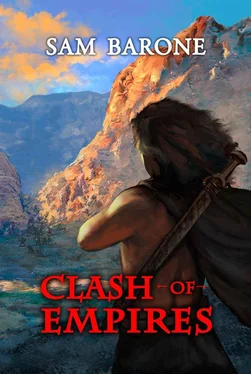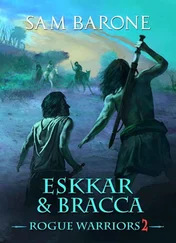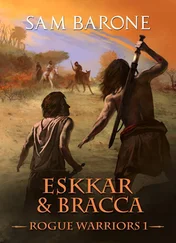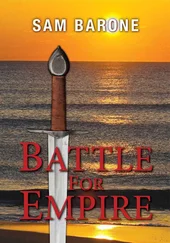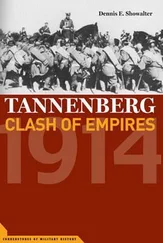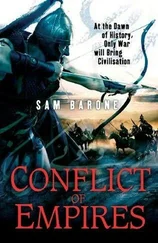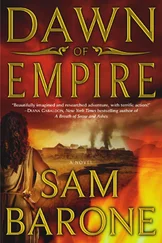Sam Barone - Clash Of Empires
Здесь есть возможность читать онлайн «Sam Barone - Clash Of Empires» весь текст электронной книги совершенно бесплатно (целиком полную версию без сокращений). В некоторых случаях можно слушать аудио, скачать через торрент в формате fb2 и присутствует краткое содержание. Год выпуска: 2013, Издательство: Eskkar Enterprises, Жанр: Исторические приключения, на английском языке. Описание произведения, (предисловие) а так же отзывы посетителей доступны на портале библиотеки ЛибКат.
- Название:Clash Of Empires
- Автор:
- Издательство:Eskkar Enterprises
- Жанр:
- Год:2013
- ISBN:нет данных
- Рейтинг книги:3 / 5. Голосов: 1
-
Избранное:Добавить в избранное
- Отзывы:
-
Ваша оценка:
- 60
- 1
- 2
- 3
- 4
- 5
Clash Of Empires: краткое содержание, описание и аннотация
Предлагаем к чтению аннотацию, описание, краткое содержание или предисловие (зависит от того, что написал сам автор книги «Clash Of Empires»). Если вы не нашли необходимую информацию о книге — напишите в комментариях, мы постараемся отыскать её.
Clash Of Empires — читать онлайн бесплатно полную книгу (весь текст) целиком
Ниже представлен текст книги, разбитый по страницам. Система сохранения места последней прочитанной страницы, позволяет с удобством читать онлайн бесплатно книгу «Clash Of Empires», без необходимости каждый раз заново искать на чём Вы остановились. Поставьте закладку, и сможете в любой момент перейти на страницу, на которой закончили чтение.
Интервал:
Закладка:
“From what we’ve learned about Elam and its people,” Trella said, “it appears that their leaders and rulers all have their defined place in society. The people are little better than slaves, and everyone does what they’re told. Otherwise they’re publicly beaten, or condemned into slavery. Soldiers strut about the marketplace, abusing the common people.”
“Yet they have a vast military,” Eskkar said, “and have used it to conquer all the lands east of the Zagros Mountain and all the way to the Indus. Whatever the lot of its people, Elam’s government is efficient enough.”
Daro nodded. “Yes, it’s true. But it is not a land I would like to live in.”
“Perhaps that is why Sabatu doesn’t feel comfortable with Akkad’s more relaxed way of doing things,” Trella said. “He was taken aback when he learned that this is our only house, and that we rule the city from here, not some vast palace filled with riches, slaves and servants. Somehow we must convince him that our way of doing things is at least equal or better than Elam’s.”
“Then I think I should see him,” Eskkar said, “and at once. I don’t want anyone, let alone a soldier with Sabatu’s experience and training, wandering throughout Akkad. Think what he could tell his former masters. The knowledge that we’re aware of the coming war would be harmful enough. He might even be able to trade such information for the return of his old privileges.”
“Yes, Husband, I agree.” Trella turned to Daro. “It’s time for Sabatu to choose his future.”
Noon approached when Sabatu climbed the stairs to the upper level of the Compound’s main house, the wooden treads creaking beneath his feet. His fear — he knew it was fear, even though a soldier should never admit to such a feeling — rose up from his belly to his throat. Daro had delivered the summons. King Eskkar of Akkad wanted to speak with Sabatu.
“You will translate for me?”
Daro had shaken his head. “I won’t be with you, so you’ll have to communicate as best you can in Akkadian. King Eskkar doesn’t speak the language of Elam, and Lady Trella has business in another part of the City.”
Sabatu knew the King had returned only last night from some training mission in the north, and it had surprised Sabatu to be sent for so soon. But he understood what it meant. The time for Daro and the Queen’s gentle persuasions had passed.
When Sabatu entered the main house, a vigilant Hawk Clan guard at the foot of the stairs had briefly studied the visitor, but Sabatu’s simple tunic fit too well to conceal a weapon. Another guard, equally formidable, at the top of the stairs repeated the examination, but both soldiers appeared to trust more to Daro’s nod of approval.
At the upper landing, the second guard opened the door, and gestured Sabatu to pass inside. The door closed behind him, and Sabatu was alone with the Akkadian ruler.
“Come in. Sit down.”
The King spoke slowly and clearly, no doubt aware of Sabatu’s recent learning of the language of the Land Between the Rivers.
No one sat in the presence of King Shirudukh of Elam. Sabatu glanced around the plainly furnished chamber, but the only chairs stood beside the table where the King sat, his back to the wall. No fancy tapestries, no jeweled swords displayed, no statues of gold, nothing to overawe a visitor and remind him of the haughty power of the King. Merchants in Sushan displayed more wealth, the better to impress their clients and customers.
The ruler of Akkad seemed as ordinary as the room. A large man, Sabatu guessed Eskkar would stand a head taller and considerably broader. The King’s tunic, much the same as the one Daro wore, left his arms bare, and powerful muscles rippled under the skin. Dark brown hair, with only a hint of gray at the temples, was fastened with a simple strip of leather. Brown eyes set in a wide forehead examined the visitor. A scar on his cheek lent a grim look to Akkad’s leader. Sabatu knew the King was an old man, in his middle forties, but the years sat lightly on his shoulders.
Even in his brief stay, Sabatu had heard many stories of King Eskkar’s prowess and fighting skills, and dismissed them as the usual tales circulated about every ruler. But now, seeing the man face to face, Sabatu decided that the narratives might be true.
The King gestured to the chair opposite his own. Sabatu crossed the room, and bowed low. Unsure of what to do, he held the position, awaiting the King’s permission to straighten up.
“Just sit, Sabatu.” King Eskkar smiled. “No need to bow like that to anyone in Akkad, or anywhere in the Land Between the Rivers. The leaders of Sumer and Isin and the other cities prefer to look at a man’s face, not stare down at the back of his head.”
Suddenly nervous, Sabatu eased himself into the seat, aware that the King’s eyes were studying Sabatu closely. He sensed the power behind those eyes. The King was a leader of fighting men as well as ruler of the wealthiest city in the Land Between the Rivers, and as such no doubt knew much about what went on inside a soldier’s mind. Leaders who could not size up a soldier’s strengths and weaknesses seldom rose to command an army.
“Let me see your hands.”
Sabatu’s eyes widened at the strange request, but the simple command carried the force of the King’s presence stronger than any words from any ruler in Elam. Sabatu lifted his hands onto the table, ashamed of their condition. The broken thumbs, injured for so many days without being set, had healed awkwardly, the bones twisted from their usual position. He could scarcely use them. Sabatu had also lost almost all feeling in the fourth and fifth finger of each hand, the result of the tough ropes that had bound his hands throughout his confinement.
The King took only a moment to examine Sabatu’s hands. “Have you tried to hold a sword?”
“King Eskkar, Daro let me try his sword, but I could not grasp it properly.” Embarrassed, he lowered his gaze. When he lifted his eyes, Sabatu saw the King deep in thought, his gaze focused only on the table.
The silence lingered for more than a few moments, and Sabatu started to think the King had forgotten his visitor, when the King abruptly rose. “Wait here a moment.” Eskkar went to the door and called out to the guard.
The King spoke too fast for Sabatu to follow the words, and the conversation went on for some time, with the guard asking several questions. At last Eskkar returned to his seat across the table.
“It is difficult thing when a fighting man can no longer fight,” the King said, as he settled back into his chair. “I’ve seen many men who had to face that bitter truth. A crushed leg, a lost arm, even a hard fall can end a soldier’s trade. Some lose all hope, others take to drinking too much ale, and a few even kill themselves, unwilling to face their friends and companions.”
The words were spoken without emotion, just a simple statement. But Sabatu felt them burn into his heart. Night and day, he had cursed the shameful fate that had taken the sword from his hands, and turned him into something less than a man. It came as a shock that a king could know such things.
“What did the healer say?”
Sabatu lifted his eyes, and found the King watching him. “The healer, Ventor, says that there is some hope, that over the years, I may regain some use of my hands.”
Eskkar grunted. “Ventor is a good healer, but a bad liar.”
“Yes, King Eskkar. But I believe he meant well.”
“He saved my life when I first came to Akkad, and he healed Trella after she was struck by an assassin’s knife. But giving false hope to a fighting man. . better to tell a soldier the truth.”
The admission that the King had once been near death surprised Sabatu. “Yes, King Eskkar.”
Читать дальшеИнтервал:
Закладка:
Похожие книги на «Clash Of Empires»
Представляем Вашему вниманию похожие книги на «Clash Of Empires» списком для выбора. Мы отобрали схожую по названию и смыслу литературу в надежде предоставить читателям больше вариантов отыскать новые, интересные, ещё непрочитанные произведения.
Обсуждение, отзывы о книге «Clash Of Empires» и просто собственные мнения читателей. Оставьте ваши комментарии, напишите, что Вы думаете о произведении, его смысле или главных героях. Укажите что конкретно понравилось, а что нет, и почему Вы так считаете.
